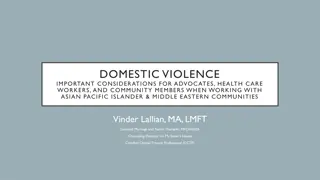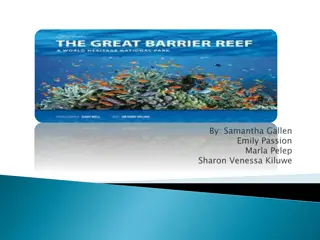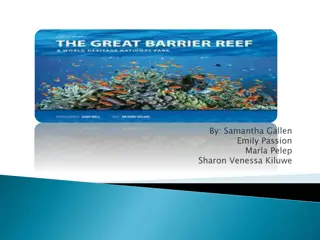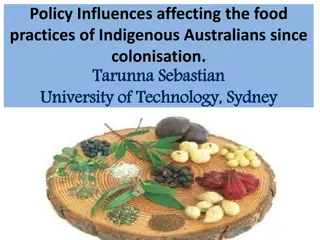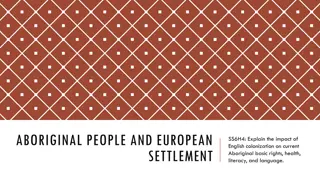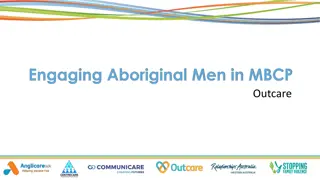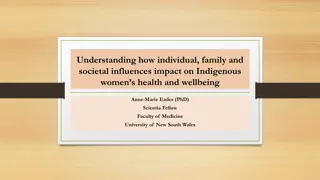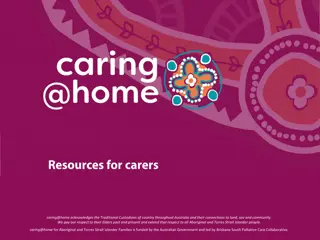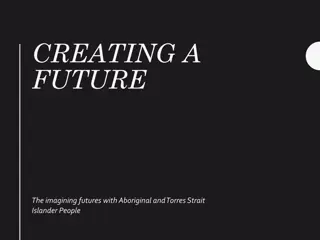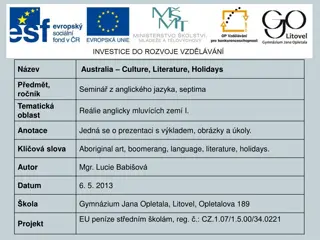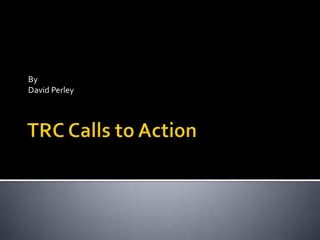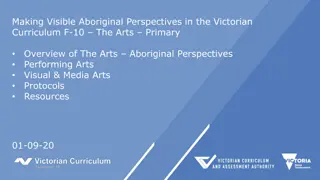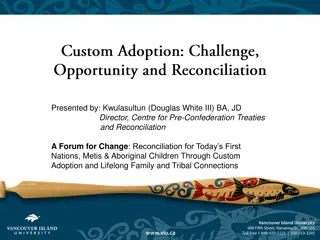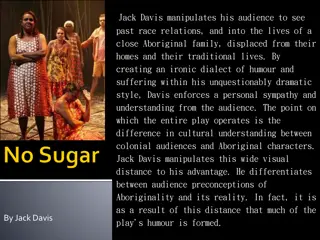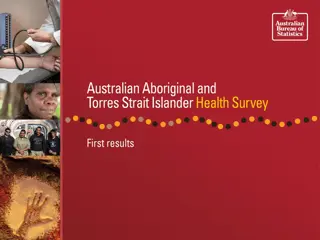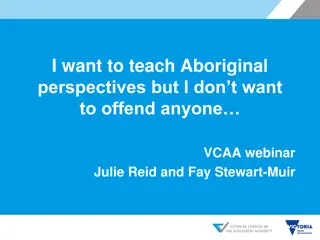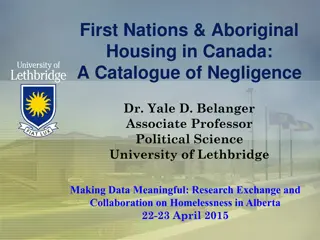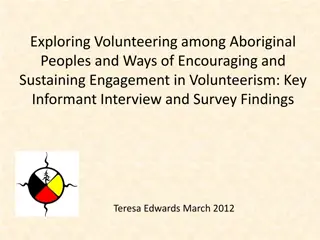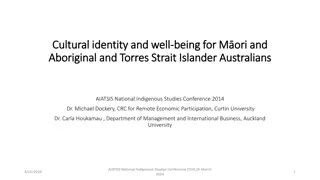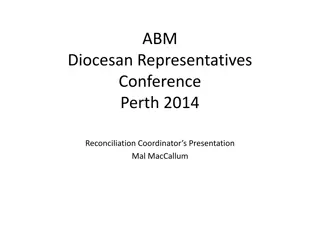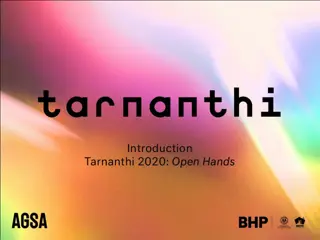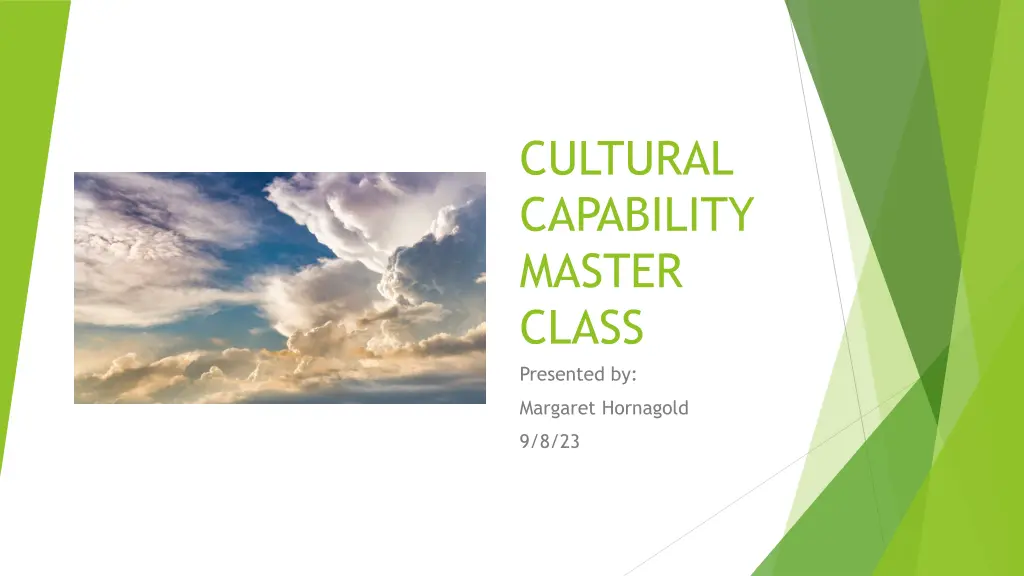
Understanding Cultural Capability: Acknowledgement of Country and Welcome to Country
Explore the significance of Acknowledgement of Country and Welcome to Country in understanding and respecting Australian First Nations culture. Learn about the importance of these ceremonies in building cultural capability and fostering genuine relationships based on trust and respect.
Download Presentation

Please find below an Image/Link to download the presentation.
The content on the website is provided AS IS for your information and personal use only. It may not be sold, licensed, or shared on other websites without obtaining consent from the author. If you encounter any issues during the download, it is possible that the publisher has removed the file from their server.
You are allowed to download the files provided on this website for personal or commercial use, subject to the condition that they are used lawfully. All files are the property of their respective owners.
The content on the website is provided AS IS for your information and personal use only. It may not be sold, licensed, or shared on other websites without obtaining consent from the author.
E N D
Presentation Transcript
CULTURAL CAPABILITY MASTER CLASS Presented by: Margaret Hornagold 9/8/23
ACKNOWLEDGEMENT OF COUNTRY I acknowledge and respect Jagera & Turrbal People as the First Nations Custodians of the land where we live, meet and work here in Meeanjin. I pay respect to their Elders, lores, customs and creation spirits. I recognise that these lands have always been places of ceremony, teaching, research and learning.
I was born on DARUMBAL country (Rockhampton); I spent my early life on ININGAI country (Isisford/Blackall); then GUNGALU (Bluff)and back to Rockhampton-DARUMBAL country. I worked on NGUNNAWAL land in Canberra and now live and work in TURRBAL and JAGERA country. My Personal Acknowledgement of Country
Why do an Acknowledgement of Country? Conducting an Acknowledgement of Country demonstrates your understanding of where you live, work and socialise. It tells people, especially First Nations people, that you are prepared to learn the truth of colonisation and show respect for the many generations of First Nations people. It helps ground you to this place and gives a sense of belonging and connection. Anyone can perform an Acknowledgement of Country
Welcome to Country The Welcome to Country is carried out by First Nations people who come from the land where the ceremony is conducted. The Welcome to Country is enriched with tradition, culture and history. Dance, art, songs and story telling can be part of a Welcome to Country. Always ensure that a Welcome to Country is covered in any planning or meetings so that the right people are given time to prepare and be able to attend. Smoking ceremonies can be a part of the Welcome and are used to drive away bad spirits and to cleanse the participants.
Cultural Capability for MHRT GUIDING PRINCIPLES FOR CULTURAL CAPABILITY 1. Valuing, understanding and respecting Australian First Nations culture 2. Include First Nations peoples involvement in decision-making at all levels 3. Ensure that there is strong leadership, accountability and responsibility within organisations to create culturally safe work places 4. Social justice & human rights leadership 5. Genuine and authentic relationships built on trust and respect 6. Embedding across all facets of organisations with strategies to plan, implement, monitor, review and evaluate at regular intervals.
Building a culturally capable practice Knowing & understanding history, culture, customs & beliefs Cultural Awareness: Knowing Cultural Sensitivity: Appreciating Culturally Capable: Embedding Being aware, authentic & open to examining your own personal beliefs and values Doing culturally appropriate action and behaviour Cultural Competence: Doing What is involved in becoming culturally capable?
CHANGES TO THE MHRT WEBSITE On the website under Member Training, include offerings that include the following: Cultural awareness Cultural capability Cultural safety Cultural engagement
BECOMING A CULTURALLY CAPABLE ORGANISATION KNOWING: Gather knowledge about local FN communities, traditional owners, Elders, organisations, culture, history, past policies, community hopes and visions BEING: Be authentic, respectful, awareness of your own biases and values, seek out FN perspectives & look to develop mutually beneficial partnerships DOING: Be curious and look for ways to engage with First Nations clients, their families and support people. Look outside the confines of institutions to allow clients to smell, see, touch, taste and enjoy life. EMBEDDING: Evaluate your service delivery and the systems used; look for cultural and innovative ways of working; explore cultural reports and understand why you do what you do.
WORKING WITH FIRST NATION CLIENTS HUMAN RIGHTS: The Mental Health Review Tribunal (Tribunal) is committed to creating and maintaining a work environment which promotes, protects and has a culture that is respectful of human rights. S28 Human Rights Act 2019 (Qld) Cultural rights Aboriginal peoples and Torres Strait Islander peoples (1)Aboriginal peoples and Torres Strait Islander peoples hold distinct cultural rights. (2)Aboriginal peoples and Torres Strait Islander peoples must not be denied the right, with other members of their community (a)to enjoy, maintain, control, protect and develop their identity and cultural heritage, including their traditional knowledge, distinctive spiritual practices, observances, beliefs and teachings; and (b)to enjoy, maintain, control, protect, develop and use their language, including traditional cultural expressions; and (c)to enjoy, maintain, control, protect and develop their kinship ties; and (d)to maintain and strengthen their distinctive spiritual, material and economic relationship with the land, territories, waters, coastal seas and other resources with which they have a connection under Aboriginal tradition or Island custom; and (e)to conserve and protect the environment and productive capacity of their land, territories, waters, coastal seas and other resources. (3)Aboriginal peoples and Torres Strait Islander peoples have the right not to be subjected to forced assimilation or destruction of their culture.
[The] Aboriginal concept of health is holistic, encompassing mental health and physical, cultural, and spiritual health. Land is central to wellbeing Crucially, it must be understood that when the harmony of these interrelations is disrupted, Aboriginal ill health will persist. Ways Forward: National Consultancy Report On Aboriginal and Torres Strait Islander Mental Health
Ways to ask questions about mental health. Different questions to ask: have you been feeling slack, not wanted to do anything? have you been feeling unhappy, depressed, really no good, that your spirit was sad? Words like slack and spirit are more consistent with Aboriginal English. Spirit implies a holistic understanding of health consistent with the definition of health held by many Aboriginal and Torres Strait Islander Australians. https://www.sbs.com.au/news/article/is-your-spirit-sad-culture-is-key-when- assessing-indigenous-australians-mental-health/gwhsa04ua
FIRST NATIONS KNOW MENTAL HEALTH Research demonstrates that mental illness was present in Aboriginal and Torres Strait Islander culture prior to European colonisation of Australia but was, most likely, a fairly rare occurrence. The much greater prevalence of mental illness in the Aboriginal and Torres Strait Islander population currently is a reflection of the significant disruption to Aboriginal and Torres Strait Islander society and has a strong context of social and emotional deprivation. Management of the issues of mental illness requires a strong emphasis on cultural safety, along with the recognition of family, culture and community in any healing process. My community uses the word Womba to refer to an Aboriginal or Torres Strait Islander person who displays mental health issues.
Other business to consider Close the Gap targets in health. All agencies must address the 4 key priority areas. https://www.coalitionofpeaks.org.au/priority-reforms Treaty Qld: https://www.dsdsatsip.qld.gov.au/our-work/aboriginal-torres- strait-islander-partnerships/reconciliation-tracks-treaty/tracks-treaty/path- treaty Voice: A Proposed Law: to alter the Constitution to recognise the First Peoples of Australia by establishing an Aboriginal and Torres Strait Islander Voice.
Participation exercise TIME TO CONSIDER 1. Discuss how the significant changes to Aboriginal and Torres Strait Islander culture and society since European colonisation have led to changes in patterns of mental illness.
Resources for working with First Nations clients https://indigenouspsychservices.com.au/services/aboriginal-mental-health- training/ https://indigenouspsychservices.com.au/products-tests/cultural-competency/ https://www.yiliyapinya.org.au/webinars https://www.wealli.com.au/ https://www.blackdoginstitute.org.au/resources-support/for-aboriginal-and- torres-strait-islander-peoples/ https://www.telethonkids.org.au/globalassets/media/documents/aboriginal- health/working-together-second-edition/wt-part-2-chapt-7-final.pdf https://youtu.be/waZ9QtIcvcg
QUOTE FROM NELSON MANDELA What counts in life is not the mere fact that we have lived. It is what difference we have made to the lives of others.

